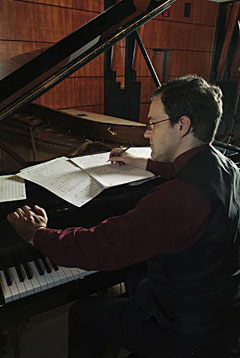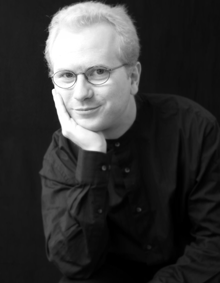
The Philharmonic Orchestra of the Americas concert at Rose Hall last night was one of those rare “what’s not to love” events that only occasionally grace New York stages. Take a program of thinking man’s bon bons (Gershwin’s Cuban Overture, Silvestre Revueltas’ Sensemayá, Ginastera’s barnburning Estancia), add a star turn by Latin music legend Paquito D’Rivera, and throw in an energetic and talented young orchestra led by a drop dead gorgeous conductor and you have a surefire receipe for fun. Many of the audience members came dressed for a post-concert gala which gave the evening a particularly elegant flair and provided a refreshing contrast to the usual New York concert-going experience where you can’t tell if your neighbor is a homeless person from Port Authority or the CEO of Ogilvy. Of course, I dress that way myself so I can hardly complain.
Alondra de la Parra, a 26-year-old Mexican conductor and pianist started The Philharmonic Orchestra of the Americas (POA) in 2004 to increase public awareness of Latin American symphonic music. The list of blue chip sponsors on the program and the monied audience suggest that her organizational and marketing skills are at least as formidable as her music talents. (Did I mention that she is drop dead gorgeous?)
But, I digress. The highlight of the evening was an appearance by the Cuban-born saxophonist, clarinetist, band leader and composer Paquito D’ Rivera who, I was a little surprised to learn, writes “serious” music that sounds quite at home on a concert program. Fantasia Mesianicas (Blues for Akoka) is a set of variations for clarinet, jazz trio, and symphony with a clarinet part inspired by Henri Akoka, a man with a great sense of humor who was the clarinetist in the premiere of Oliver Messiaen’s Quartet for the End of Time, not exactly a humorous piece. Memories (Danzón), based on the national dance of Cuba, is a romantic vision of moonlit nights filled with dangerous rhythms and elegant cornet lines, channeling the great orchestras that played the grand hotels that once graced the Havana shoreline. D’Rivera performed a couple of encores, including a show-stopping clarinet/piano duo. (Terrific pianist, by the way, although I couldn’t find his name in the program. Anybody know?)
The second half began with the world premiere of Ixbalanqué, a moody, often dark, tone poem drawn from Mayan legend, by the 26-year-old Mexican composer Martin Capella. The piece was the first winner of the POA’s Young Composers Competition, which invited composers aged thirty-five and younger from the American continent to submit an 8-12 minute work for orchestra. Robert Beaser, Paul Brantley, Mario Lavista, Tania León and Nils Vigeland were the judges. Ixbalanqué is an accomplished work but it’s a little tough to precede (or follow) Sensemayá, an undisputed masterpiece of the short, Latin genre which is so obviously Ixbalanqué’s granddaddy.
To cap off a perfect evening, de la Parra whipped the orchestra through Ginestera’s exhuberant Estancia, bringing the audience to its collective feet with the wild and crazy Danza final – Malambo.
Beyond being a lot of fun, the concert was a useful reminder of how deeply and irreversibly the Latin musical language is ingrained into–and enriches–North American culture. There is nothing foreign or alien or threatening about it; this is our music too. A useful rejoiner to the growing wave of xenophobia that hovers over the land in these troubled times.
 It’s
It’s 
 First Jeff Harrington, then David Salvage, and now our very own
First Jeff Harrington, then David Salvage, and now our very own  For the past 27 years, the Mexican-born pianist and composer
For the past 27 years, the Mexican-born pianist and composer  Attention Boston (and NY) shoppers! The world-premiere run of David Salvage’s String Quartet No. 2 is at hand. The
Attention Boston (and NY) shoppers! The world-premiere run of David Salvage’s String Quartet No. 2 is at hand. The 